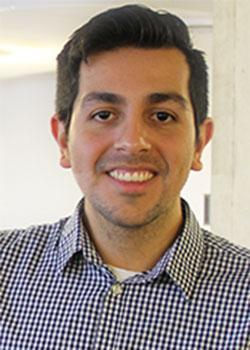Francisco Rios Casas grew up in the Los Angeles sprawl in an area known as Santa Ana. As he spent more time exploring the city during high school, and later at the University of Southern California, Francisco became more aware of the impact the built environment can have on physical and mental health, especially in low-income Latino communities like the one he grew up in.
A first-generation college and graduate student, Rios Casas was awarded the Master’s Fellowship from the UW School of Public Health. He works as a research assistant for the Latino Center for Health, the first research center in the state of Washington to focus solely on issues of Latino health.
Why did you decide to study epidemiology?
I knew I wanted to study population health, and I knew that epidemiology would teach me the skills to do that. I decided to get my MS in epidemiology and focus on understanding mental health at the community and population level; more specifically, how we can better understand social stressors and the prevention of mental illness.
Why did you choose the UW?
The UW Department of Epidemiology had several faculty members whose research interests overlapped with mine. This was very important for me in making my decision. Since coming here, I’ve realized I could also approach my interests through the lens of trauma and its outcomes. Having these different options to think about my research question and goals has opened my eyes to the potential impact of my work.
Why are you passionate about mental health?
Mental health issues have been prevalent in my family for several generations, from my grandmother to my mother and her sisters. My mom immigrated to California from Mexico a few years before I was born. She struggled a lot, not knowing anybody and barely speaking English. In choosing to raise me [in the U.S.], she had less social and family support compared to what she would’ve had in her hometown. It was almost isolating. This stress — combined with her past experiences and her current environment — affected her mental health.
Looking back now, I understand what she was going through, and it’s actually very common for people in her situation. That’s how I became interested in the way our stressors and the environment interact to impact health and how one generation’s stress. Also, how trauma can be passed down to impact the next generation’s development and relationships with others.
Tell us about your work with the Latino Center for Health.
I'm helping to set up a study with Latina immigrants in Seattle. Called the Amigas Latinas Motivando el Alma Project (ALMA), it's led by India Ornelas, an associate professor in health services and research director for the center. My work includes performing literature reviews, preparing measures and some of the study materials, such as data collection surveys, assisting with some early participant recruitment and site setup.
So far, I’ve learned that the Seattle Latino immigrant community recognizes the importance of mental health for their overall well-being. Similar to what I saw in LA, there’s a need for mental health services, but there may also be a lot of stigma about getting help, in addition to other barriers to accessing these services. I'm really excited to be involved with community-based research in mental and behavioral health and to see the efforts to address important health issues in immigrant and Latino communities in Seattle.

